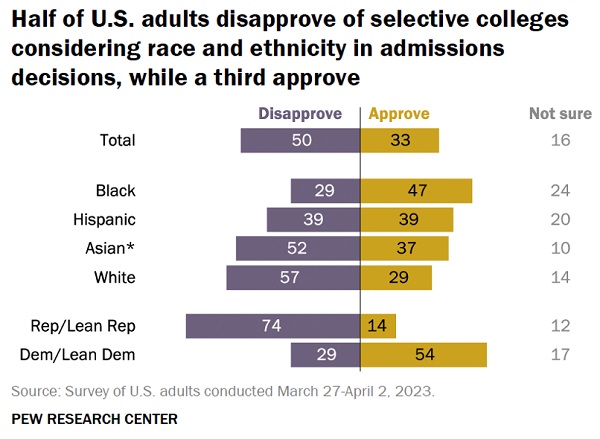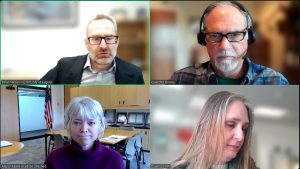Where the left has lost the voters
4 min read
by Marty Wilde
Many disagreements between the political parties come down to a difference of opinion on how to accomplish a goal, rather than a lack of a shared interest in accomplishing it. Our current political environment works to emphasize the different views, rather than treating them as resources for collaboration. And too often, the voters’ general values and preferences lose out in these discussions.
Recently, the political left has seemed to ignore the clear will of the voters in a few areas, including border security, racial preferences, and natural gas as a bridge fuel.
Border security. Most Americans want a secure border—77% view the U.S.-Mexico border situation as either a crisis or a major problem. In effect, our policies assume all asylum applications are made in good faith, and we release almost all those who claim asylum after crossing the border, even between border patrol station. This has made the border an attractive nuisance—bad for our security and bad for people with legitimate asylum claims.
The left has opposed policies that limit the ability to claim asylum for people who try to enter between crossings, ignoring both the very low success rates of such claims and the reality that, other than at the border, Mexico is now safe enough that it has become a preferred destination for vacations. The Biden administration’s recent policy change limiting asylum claims by people crossing away from official border crossings by the is a good first step in improving security.
More than 80% of Americans support immigration through the “front door” of the regular process, but they take a negative view of people who “break the rules.” The follow-up steps necessary to secure the border while allowing well-founded claims include funding the asylum court system, establishing consulates in Mexico away from the border to receive these claims, supporting the Mexican government responses to asylum claimants in that country, and providing greater resources for border enforcement.
But all of these steps rely on a Congress that is dysfunctional. With Congress paralyzed by the desire of the former president to keep his successor from successfully addressing the immigration problem, there will be no comprehensive solution before the election.
Racial Preferences. Americans believe in the American Dream, even when it has failed some people. The battle over affirmative action boils down to simple, competing ideas. The political right believes that you can’t compensate for negative racial discrimination with positive racial discrimination. The political left believes that the best way to remedy past (and current) racial injustices is simply to give those who have suffered from them an advantage in the present.
The right has won the argument. More than two-thirds of Americans agree with the Supreme Court decision that eliminated racial preferences in college admissions. The results are similar for employment preferences, with 72% opposing racial preferences.
But again, Americans are fair-minded; three-quarters feel it is very or somewhat important for companies and organizations to promote racial and ethnic diversity in their workplace. My former employer, the Board of Veterans Appeals, took a strategic approach when the leadership realized that its employees did not reflect the communities surrounding their Washington, D.C. offices. They started recruiting at Howard University, a historically Black school near the Board’s offices. They did not give those applicants a preference; they merely asked them to apply, with good results.
A New York Times data journalism article found that the same was true for college admissions. By identifying good performers in at-risk schools and inviting them to apply, highly selective colleges could achieve diversity without an affirmative racial preference. Put another way, we can achieve school and workplace diversity without the racial preferences most Americans dislike by using new approaches to problem-solving.
Bans on the personal use of fossil fuels. Polling shows that 74% of Americans support our international efforts to reduce carbon pollution and 67% support prioritizing renewable power sources. Conversely, 72% oppose banning natural gas for new homes and 59% oppose banning sales of new gasoline-powered cars and trucks after 2035.
While it would be easy to dismiss this as “good for thee, but not for me” thinking, it does suggest that the transition away from the personal use of fossil fuels should take a “more carrot than stick” approach. We have incentives for heat pumps, induction stoves, and electric vehicles. Keeping these incentives robust and well-advertised represents a clear path forward to incentivize personal engagement on reducing greenhouse gas emissions.
Successful politicians can lead the public a little or follow the public a little, but when they get completely out of step with public opinion, they are no longer successful. Public opinion changes over time, but rarely quickly. As we address the challenges we agree face our country, the values of the voting public matter. Recognizing the differences in our views and experiences as assets in problem-solving could lead to more productive collaboration.
Marty Wilde represented central Lane and Linn counties in the Oregon legislature. For more of his Letters From a Recovering Politician, subscribe at https://martywilde.substack.com/subscribe.
Image courtesy Pew Research Center. Estimates for Asian adults are representative of English speakers only. Survey of U.S. adults conducted March 27-April 2, 2023.






